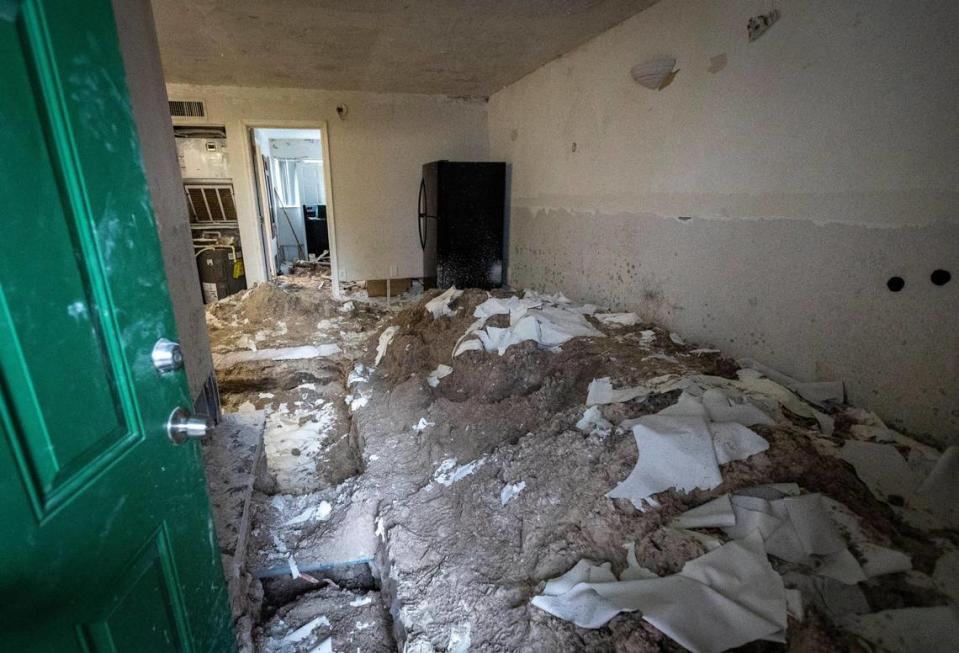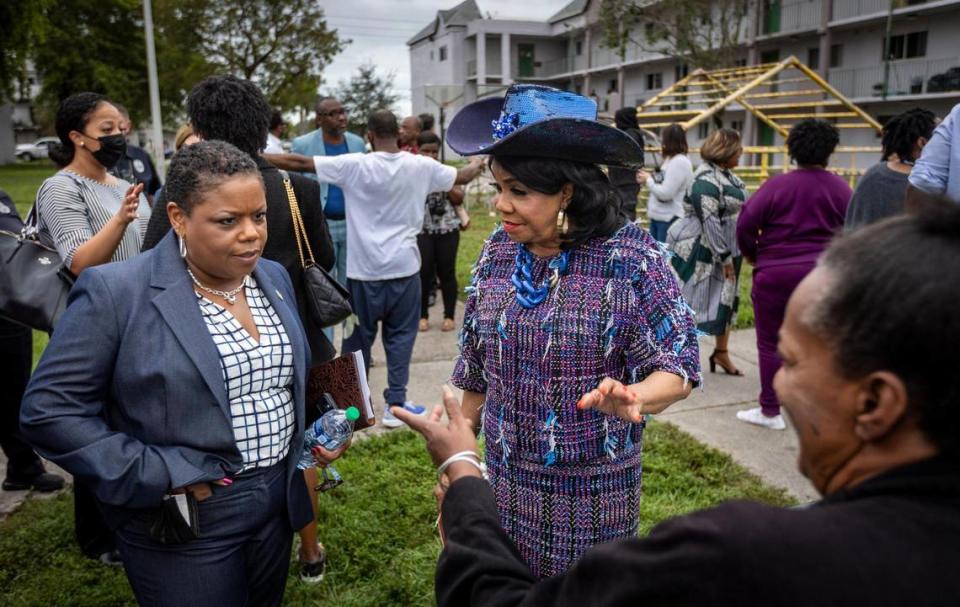Opa-locka housing-complex residents live with mold, sewage issues as county sues owners
In apartment 130, a rank odor seeps from the living room as Theresa Tyson opens the door at her first-floor unit at Glorieta Gardens in Opa-locka. Tyson, 64, is so accustomed to the stench she said she no longer smells it.
“Y’all can smell that?” she asked a group of reporters and local and federal officials on a tour of the property Monday afternoon. Tyson said she has only lived in that particular unit for a year, but has resided at Glorieta for 30 years and has respiratory issues.
Tyson is one of several residents who have sanitation issues at Glorieta Gardens, an affordable-housing complex that is home to 533 occupants, including small children. The property, which was the subject of a Miami Herald investigation in 2018, is now facing a lawsuit filed by Miami-Dade County against the owners
In 2018 residents had to deal with mold, poor sewage and roofing problems.
On Monday, five years later after the Herald investigation, U.S. Rep. Frederica Wilson described continuing poor living conditions for residents and shoddy work from contractors painting over mold. “People are defecating in garbage bags, tying it up and putting in the garbage,” Wilson said Monday as she toured the property with representatives from the federal Department of Housing and Urban Development.
RELATED: Mold, roaches, sewage — what this low-income housing looks like after a pricey rehab
Opa-locka Mayor John Taylor and interim City Manager Darvin Williams pointed to specific damages at the 357-unit property, including sewage issues that have led to feces in residents’ tubs, the removal of an oven in a unit housing a family of five, and extensive flooding on ground-level apartments.
Efforts to reach property owners for Glorieta Gardens were unsuccessful Monday evening.
Owners Glorieta Partners LTD, Glorieta LLC, New Vision Glorieta LLC, and NB Holdings Management LLC are named in the lawsuit. Yash Pal Kakkar, manager of NB Holdings Management, and Kenneth G. Weiss, manager of New Vision Glorieta, are also named in the suit, which was filed on Dec. 26 and is seeking more than $50 million in penalties.
Past issues
Built in the early 1970s, Glorieta Gardens consists of two sections on Alexandria Drive and Northwest 30th Avenue off Opa-locka Boulevard. At the time, the property was bordered by a former lake filled with solid waste.
In 1992, real estate developer and entrepreneur Dilip Barot bought the complex for $538,000, the Herald reported. Barot sold the property in 2015 for $20.3 million to Glorieta Partners, a partnership between a company managed by Barot’s wife, Naimisha, and New Vision Housing Foundation, a nonprofit.
In 2015, Glorieta Partners received $24 million of tax-exempt bonds for to buy and renovate the property, including new roofs, doors, and installing new appliances. among other upgrades, the Herald reported in 2018.
But resident Ibet Lopez, 60, who was featured in the 2018 article about conditions at the complex, said few changes have been made and that the owners hired contractors to merely cover up the mold and mildew inside homes.
“They put them to work at off hours,” she said. “So when the inspectors come in, there’s nothing.”
‘They’re playing games’
Following the Herald’s 2018 reporting, little was done to improve living conditions at the housing complex. And last year, Opa-locka condemned a building on the property for having mold and after a structural-integrity review.
Last April, Glorieta Gardens received a score of 33 on HUD’s Real Estate Assessment Center, which rates affordable housing properties on a scale of 0 to 100. In September, that number increased to 60. In recent months Wilson, HUD and Williams have tried to meet with Glorieta Gardens owners to remedy the situation, but Wilson said despite the attempts little has been done.

“They’re playing games,” she said of the owners. “They’re using all of us. They’re abusing the taxpayers’ money of this country. It’s not just about Glorieta.”
And what little has improved has only led to temporary relief for some residents, such as being moved from hazardous buildings into hotels, Wilson said.
Williams said six families are staying at a hotel and 47 are living at extended-stay inns. Tiffany Smith, 43, was one of the residents who was moved to a hotel in Doral after her building was condemned by the city.
Smith, 43, a concessions stand prep employee at Hard Rock Stadium, said her unit had significant sewage issues, and recent flooding in the area made it challenging to commute to work. The longer distance from her job has also made her commute to work more difficult.
“I get on public transportation and a bike,” she said, adding that Lyft and Uber can be expensive. “So I have to go through the flooded water to get where I need to go.”
For its part, the city started a housing task force to address ongoing issues with affordable and livable conditions. “These are residents. We care here,” Taylor, the mayor, said. “It hurts our hearts because these are the people that we grew up with and we live with that surround us in this beautiful city.”

HUD Regional Administrator Jennifer Collins said she and her team will take the information they’ve gathered from Monday’s site visit back to department officials. Collins, who has been on the job for a month, emphasized that the Glorieta Gardens is a top priority.
“Now that we’ve all seen the situation, we can talk about what is legally feasible for us to do,” she said.
Lopez said she hopes HUD acts in the best interest of residents and not the owners.
“They need to place these individuals in a safe environment,” she said. “HUD knows that this is not a safe environment. They know that the children have respiratory issues, asthma and other things.”
Miami Herald staff writer Jay Weaver contributed to this report.

